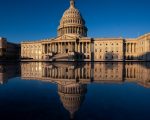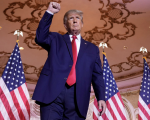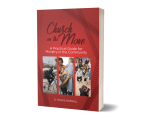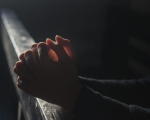News
Blowing the Whistle on the World Cup
In this edition of A Public Witness, we’ll coach you up on the history of the men’s World Cup and the particular details around the 2022 tournament in Qatar that begins in just a few days — and we’ll explain why the penalty cards should come out for these games. Then we ask an important question: Should Christians (and others) watch the contests knowing the blood, sweat, and tears required to make them possible?
Faith Groups Split Over Bill to Protect Same-Sex Marriage
Among U.S. faith leaders and denominations, there are sharp differences over the bill advancing in the Senate that would protect same-sex and interracial marriages in federal law. The measure, a high priority for congressional Democrats, won a key test vote Wednesday.
As Trump Launches New Presidential Bid, Will Former Faith Advisers Back Him?
When Trump announced yet another White House bid from his Mar-a-Lago resort in Florida on Tuesday, he did so with a speech devoid of overt religious references. While some of Trump’s stalwart evangelical supporters were there — namely, conservative commentator Eric Metaxas, pastor Mark Burns, and MyPillow CEO Mike Lindell — many of the former president’s longtime religious defenders were nowhere to be seen.
MacKenzie Scott Gives $15 Million to Lutheran Immigration and Refugee Service
Novelist and philanthropist MacKenzie Scott has awarded Lutheran Immigration and Refugee Service $15 million in donation funds, the single largest contribution in the advocacy organization’s 83-year history. Scott’s $15 million donation comes as the group works to resettle Afghan refugees, people fleeing Russia’s invasion of Ukraine, and asylum-seekers along the U.S.-Mexico border.
Tennessee Preacher and MAGA Celebrity Greg Locke Claims YouTube Has Banned Him
Greg Locke, a Tennessee pastor known for his viral videos about COVID-19, election conspiracies and witchcraft, claims another social media giant has given him the boot. A Donald Trump supporter who has been featured at Christian nationalist events such as America’s Revival and disgraced former Trump official Mike Flynn’s ReAwaken America tour, Locke was banned from Twitter last year for spreading misinformation.
Review: Church on the Move
Robert D. Cornwall reviews "Church on the Move: A Practical Guide for Ministry in the Community" by G. Travis Norvell. Churches can easily become insulated from the surrounding world. They create silos by turning turn inward, seeking to protect whatever space they have accumulated over the years. This book challenges us to examine our context and consider how the church can be present in the broader community.
Did Faith Fall off a Cliff During COVID? New Study Says No.
When the pandemic hit, many Americans lost the habit of churchgoing after almost every church in the country closed their in-person services and shifted online. But did some of them give up on God? In a new study, sociologists raise questions about the rapid decline in indicators of “intense religion” during the pandemic, which they argue may be due to changes in a popular survey rather than a sign of religious decline.
A Requiem for Twitter
As Twitter’s new owner bumbles along and risks destroying the very network he just purchased for $44 billion, we thought we’d take a look at why this matters — even to people not on Twitter. In this issue of A Public Witness, we look at the erratic chirping happening right now at Twitter. Then we suggest what might be lost if the blue bird app goes the way of Myspace or Friendster.
The Keys to Letting Go
Pastor Dawn Darwin Weaks explores what it was like for a once large and vibrant church community to decide to make a major change. With only a few dozen active people left, they made the choice to relocate, rename, and relaunch together. Before the 116-year-old congregation gathered for worship in a new space, they performed one last ritual in order to truly let go.
A ‘Missionary to Christian Nationalists,’ Phoenix Pastor Urges Conversion, Not Confrontation
Phoenix pastor Caleb Campbell has a theory about the growing number of Americans who are labeled as Christian nationalists. Most would rather go to Cracker Barrel than storm the Capitol. Many see themselves as good Christians who love their country. But somewhere along the way, they began to think being a good American and being a Christian were one and the same.










